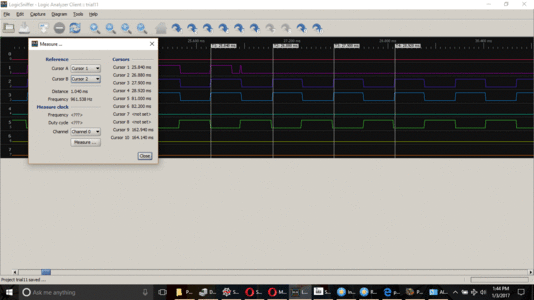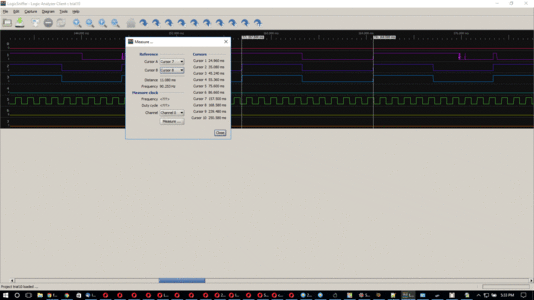Difference between revisions of "Blinking Blues"
Russ hensel (talk | contribs) (→What) |
Russ hensel (talk | contribs) |
||
| Line 64: | Line 64: | ||
Logic sniffer is the dangerous prototypes single board device http://dangerousprototypes.com/docs/Logic_Sniffer_101 | Logic sniffer is the dangerous prototypes single board device http://dangerousprototypes.com/docs/Logic_Sniffer_101 | ||
| − | Measurement taken using the cursor measurement, finding some good pulses at the beginning and then visually scanning, then measuring for bad pulses later on. All recorded to a spreadsheet, that | + | Measurement taken using the cursor measurement, finding some good pulses at the beginning and then visually scanning, then measuring for bad pulses later on. All recorded to a spreadsheet, that is uploaded to the web, see section above. |
| − | |||
= Who I Told = | = Who I Told = | ||
Revision as of 16:18, 3 January 2017
Blink Does Not Work? Having some trouble with arduino blink. Write up here. Draft still working on this but if you can figure it out contact me User:Russ_hensel.
Contents
Origin
I have been messing about with steppers and simple drivers for some time. Recently I put a logic analyzer into use and noticed that the switching wave forms were a bit off. Simplifying this I went back to the basic blink and took a look at it. It also had some anomalies. This began an investigation of various blink code and the results. So far I have not found code that gives good results. In this investigation I am focusing on using pulses with half periods of 500 and 5000 micro ( not milli ) seconds.
Blink
What I Expect
The blinks I worked with for this investigation were all in the 1 to 10 ms or so period time frame. I used only the microsecond built in functions. I expected that the timings would:
- be repeatable in the range of a few microseconds.
- be accurate in the range of 10 to 20 microseconds.
What I Found
- I found glitches in the waveform of up to 1 or more milliseconds ( 1000 microseconds )
- Often the glitches would repeat every 81.92 milliseconds or so. Interestingly enough if I divide this time by 16 e6 I get 512 which is more or less a magic number.
What I Tried
- Different arduino boards
- Different pins
- Different implementations of blink
- Interrupts on and off
Issues Investigated
- Was the logic sniffer the glitched one: Do not think so, I generated a square wave on an oscillator at 1KHz ( period 1 ms ) and looked for glitches in it. Nothing found.
- Used different versions of the code, take a look at my code posted here.
- Used 2 different types of arduino
- Used different arduino exe, 1.6.1 and 1.8.0
- Used both 5000 us and 500 us as test delay.
Things Yet to Try
- More boards
- Different builds of the arduino software
- More pin variations
- Check unused pins, perhaps change all to output low....
Some Results
In the image below the data from the arduino is being measured on channel 3, the test signal from the oscillator is on channel 5 and the rest are grounded or some sort of junk I have not gotten rid of. Click on it to go to a page with the image and then again to go full size which I did not do here to reduce the clutter. This measurement shows the good pulses. I typically use the sniffer cursors 1 to 4 for four consecutive good pulses. A good pulse is one very near the desired one, for example aiming at 10.00 ms I may get 10.120 ms. I actually expect some extra time ( perhaps not this much ) as there is some overhead in the routine. A bad pulse is typically off by much more ( 11.360 ms ). Bad pulses are identified by eye then tested using cursors 5 through 10. In both cases the good and the bad are consistent across many periods. The most consistent result is that bad pulses are separated by about 81.92 ms. And 81.92 / 16 meg Hz = 256 * some power of 10. That it comes out at the magic number of 512 seems very significant, but I am not sure why yet.
Bad pulse from the same test run ( or one with similar timings ):
More Results in Files
You can check out my results using these files or starting from scratch. I am still working on these timings so files may change, but I am putting up some versions now ( Jan 3 2017 )
- Arduino Code -- I keep adding to it, but the old subroutines that have been timed are not changed. It consists of 4 files that need to be unzipped into a directory called Blinkers and then opened with the arduino software. It is hosted on a google drive at: Blinkers
- Results spreadsheet: contains some of the measurements I have taken from the logic sniffer. It is in open office format. [1]
- Sniffer project files. They are all zip and hosted on a google drive at: [2]. These files can be opened with the logic sniffer software found at Logic sniffer software download
Test Setup
Logic sniffer is the dangerous prototypes single board device http://dangerousprototypes.com/docs/Logic_Sniffer_101
Measurement taken using the cursor measurement, finding some good pulses at the beginning and then visually scanning, then measuring for bad pulses later on. All recorded to a spreadsheet, that is uploaded to the web, see section above.
Who I Told
What
Blink is the Hello World of the Arduino. So would it be a surprise if it did not work? It sure surprises me. It does seem broken. Now in my case I am running it faster than the standard demo, but not real fast. I have tried a lot of code with a lot of variations, but for the basics:
while ( true ) {
digitalWrite( ledPin, HIGH ); // turn the LED on (HIGH is the voltage level)
delayMicroseconds( 5000 ); // wait
digitalWrite( ledPin, LOW ); // turn the LED off by making the voltage LOW
delayMicroseconds( 5000 ); // wait
}
I get a blink all right but the timings are not right, typically a glitch every 81.92 ms. I am blinking about every ms or so and timings are off by say 10%.
If you think blink works please look at: http://www.opencircuits.com/Blinking_Blues and tell me where I went wrong. Insightful suggestions may be tried out by me. It would be nice to rebuild confidence in this iconic program.
Who
Arduino Forum http://forum.arduino.cc/index.php?topic=445889.0

